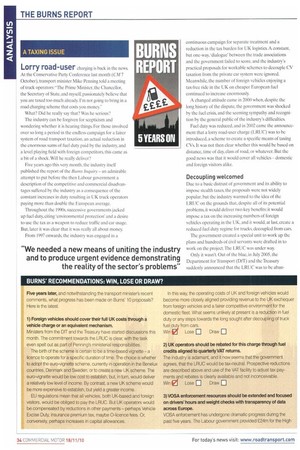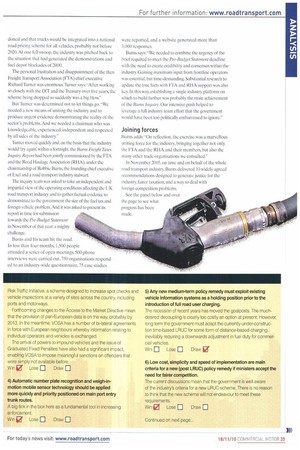BURNS' RECOMMENDATIONS: WIN, LOSE OR DRAW?
Page 34

Page 35

If you've noticed an error in this article please click here to report it so we can fix it.
Five years later, and notwithstanding the transport minister's recent comments, what progress has been made on Burns' 10 proposals? Here is the latest.
1) Foreign vehicles should cover their full UK costs through a vehicle charge or an equivalent mechanism.
Ministers from the DfT and the Treasury have started discussions this month. The commitment towards the LRUC is clear, with the task even spelt out as part of Penning's ministerial responsibilities.
The birth of the scheme is certain to be a time-based vignette — a licence to operate for a specific duration of time. The choice is whether to adopt the euro-vignette scheme, currently in operation in the Benelux countries, Denmark and Sweden, or to create a new UK scheme. The euro-vignette would be low cost to establish, but, in turn, would deliver a relatively low level of income. By contrast, a new UK scheme would be more expensive to establish, but yield a greater income.
EU regulations mean that all vehicles, both UK-based and foreign visitors, would be obliged to pay the LRUC. But UK operators would be compensated by reductions in other payments — perhaps Vehicle Excise Duty, insurance premium tax, maybe 0-licence fees. Or, conversely, perhaps increases in capital allowances. In this way, the operating costs of UK and foreign vehicles would become more closely aligned providing revenue to the UK exchequer from foreign vehicles and a fairer competitive environment for the domestic fleet. What seems unlikely at present is a reduction in fuel duty or any steps towards the long sought after clecoupling of truck fuel du V from cars.
Win Lose Draw ID
2) UK operators should be rebated for this charge through fuel credits aligned to quarterly VAT returns.
The industry is adamant, and it now seems that the government agrees, that the LRUC would be tax-neutral. Prospective reductions are described above and use of the VAT facility to adjust tax payments and rebates is clearly available and not inconceivable. Wing Lose El Draw El
3}VOSA enforcement resources should be extended and focused on drivers' hours and weight checks with transparency of data across Europe.
VOSA enforcement has undergone dramatic progress during the past five years. The Labour government provided £24m for the High
Risk Traffic Initiative, a scheme designed to increase spot checks and vehicle inspections at a variety of sites across the country, including ports and motorways.
Forthcoming changes to the Access to the Market Directive mean that the provision of pan-European data is on the way, probably by 2013. In the meantime, VOSA has a number of bi-lateral agreements in force with European neighbours whereby information relating to individual operators and vehicles is exchanged.
The arrival of powers to impound vehicles and the issue of Graduated Fixed Penalties have also had a significant impact, enabling VOSA to impose meaningful sanctions on offenders that were simply not available before. Win Pr Lose J Draw p
4) Automatic number plate recognition and weigh-inmotion mobile sensor technology should be applied more quickly and priority positioned on main port entry trunk routes.
A big tick in the box here as a fundamental tool in increasing enforcement.
Win R° Lose fl Draw 0
5) Any new medium-term policy remedy must exploit existing vehicle information systems as a holding position prior to the introduction of full road user charging.
The recession of recent years has moved the goalposts. The muchdesired decoupling is clearly too costly an option at present. However, long term the government must adapt the currently-under-construction time-based LRUC for some form of distance-based charging, inevitably requiring a downwards adjustment in fuel duty for commercial vehicles.
Win Lose E Draw Pr
6) Low cost, simplicity and speed of implementation are main criteria for a new (post LR(JC) policy remedy if ministers accept the need for fairer competition.
The current discussions mean tnat the government is well aware of the industry's criteria for a new LRUC scheme. There is no reason to think that the new scheme will not endeavour to meet these requirements.
Win EZ Lose 0 Draw 0




































































































































